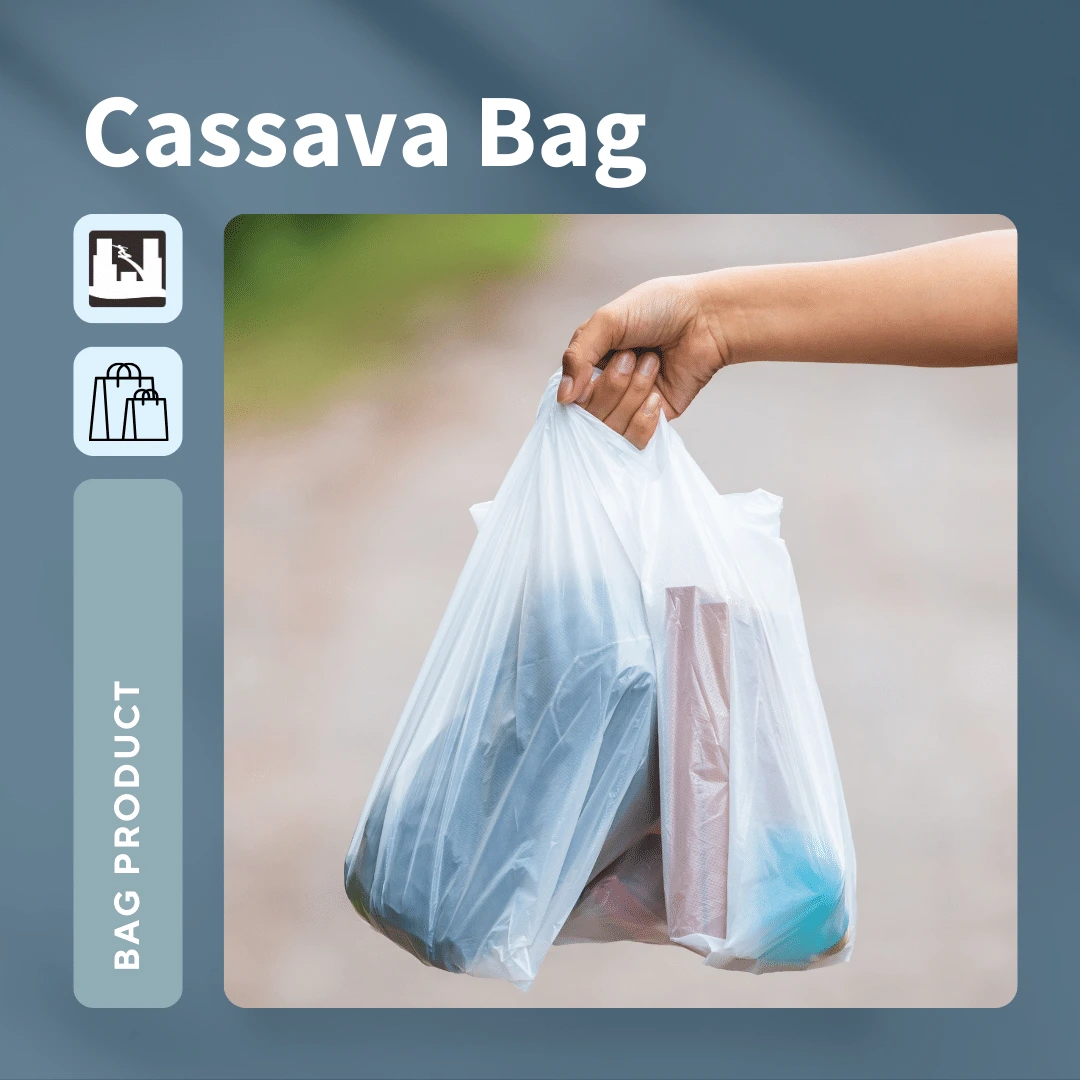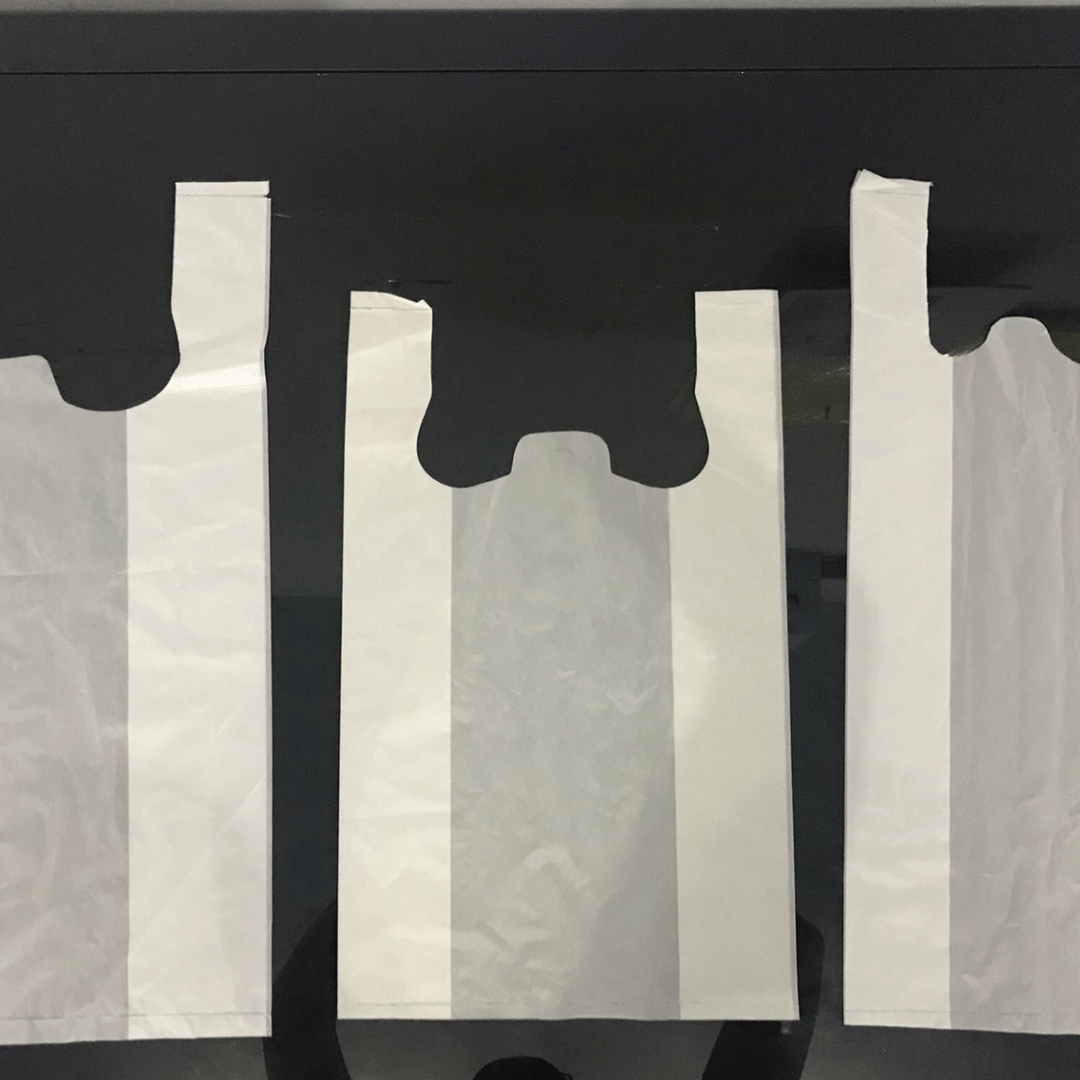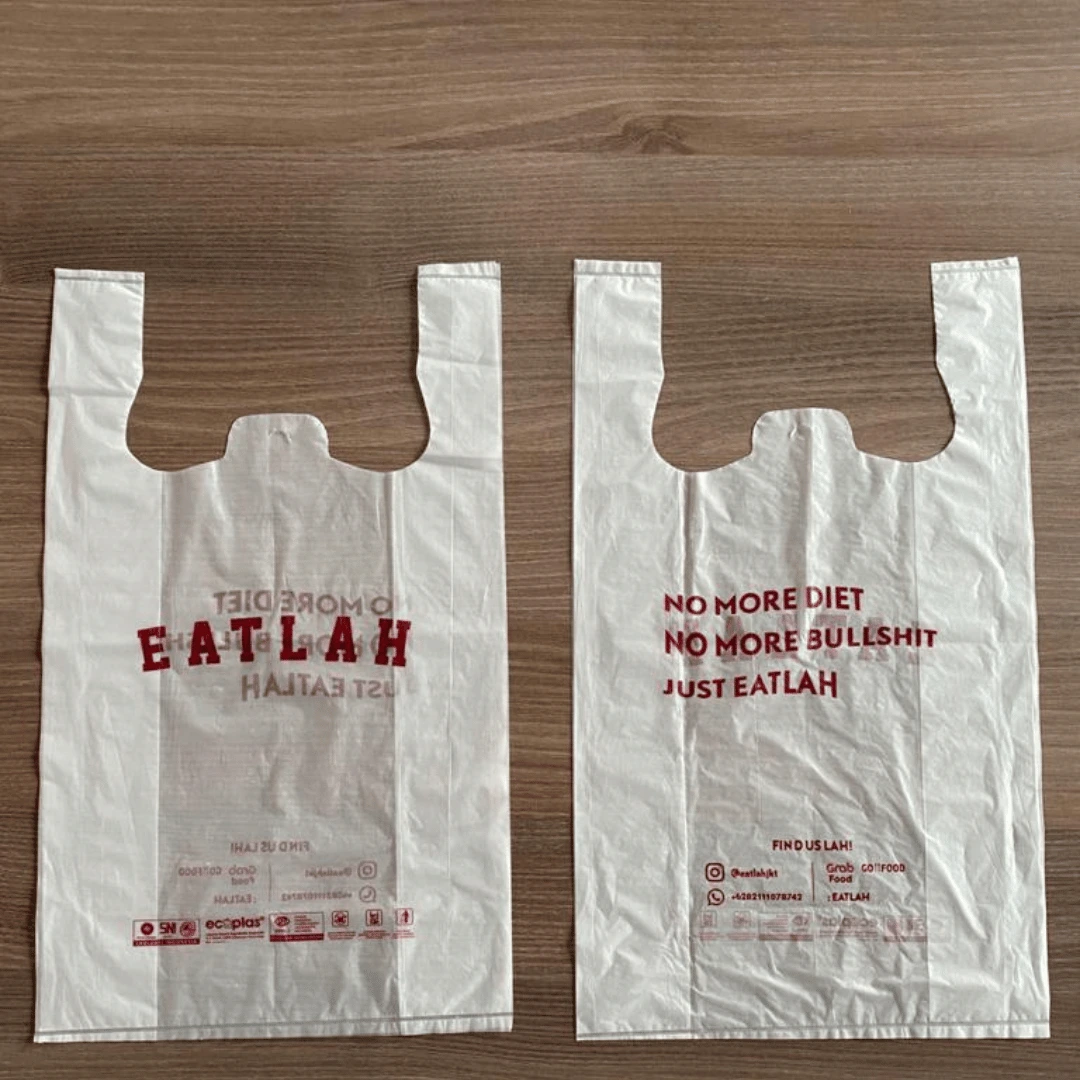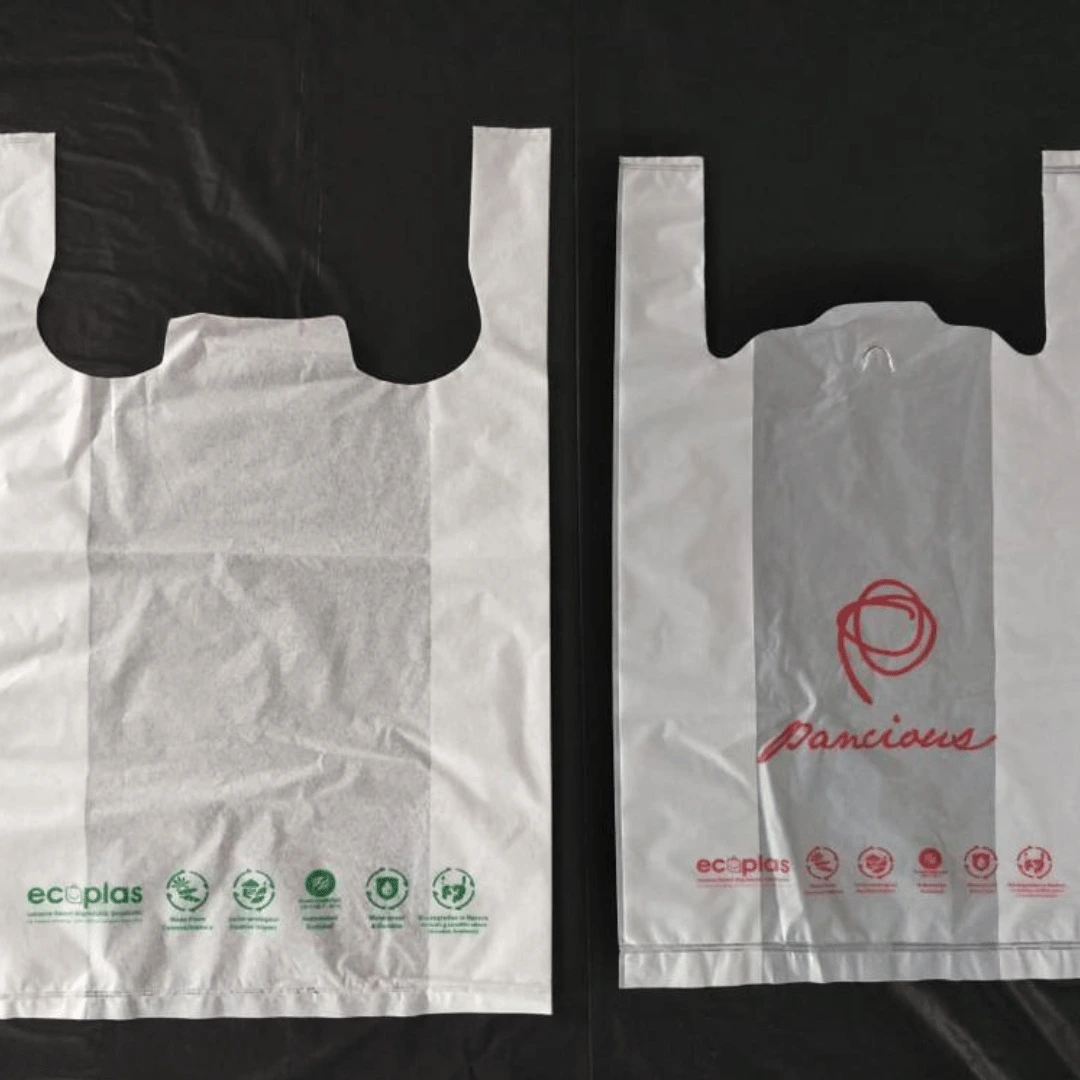Cassava Bag
Eco-Friendly Cassava Bags
Urban Plastics, an Indonesian manufacturer, produces biodegradable bags from cassava using Ecoplas Resin, a blend of cassava starch and polyethylene polymer. These bags decompose naturally within six months, offering an eco-friendly alternative to plastic waste. As demand for sustainable solutions grows, especially in markets like Australia, cassava bags provide a practical, versatile option. They can be customized into T-shirt bags, garbage bags, straws, mailer bags, and more, making them ideal for businesses adopting greener packaging.
We produce two types of cassava bags:
1. Urban WS (Water Soluble): This biodegradable bag requires no industrial composting facility. It can break down naturally through the action of macro and micro-organisms in composting conditions, offering an eco-friendly solution for waste reduction.
2. Urban WR (Water Resistant): A water-resistant cassava bag that is not only biodegradable but also compostable. This versatile bag offers both durability and environmental benefits, breaking down naturally in compost conditions.
Urban WS (Water Soluble): The Sustainable Cassava Plastic Solution
Urban WS is a revolutionary water-soluble cassava plastic designed with sustainability in mind. Made from industrial starch and oil-derived vegetables, it contains no harmful plastics such as PE, PP, PS, or PET. This biodegradable plastic is a game-changer for eco-conscious consumers and businesses alike, offering a more sustainable alternative to traditional plastics.
One of its key advantages is its ability to biodegrade fully, transforming into compost after use and contributing positively to the environment. Urban WS can even be recycled with paper waste, aligning with principles of waste reduction and resource recycling.
Environmentally Safe and Sustainable
Safety is at the core of Urban WS. This eco-friendly bag is completely safe for both animals and plants, and it does not contribute to the creation of microplastics, a growing concern in environmental sustainability. Thanks to its antistatic properties, it ensures that its contents remain clean and dust-free, offering superior protection for sensitive items.
The high oxygen barrier in Urban WS makes it the ideal solution for dry food packaging, keeping contents fresh and extending shelf life. Whether used for food, retail, or general packaging needs, this biodegradable bag ensures your products remain safe and fresh.
Long-Term Storage with Zero Waste
With a storage life of up to 2-3 years, Urban WS offers practical storage solutions while remaining environmentally friendly. It’s not just an eco-conscious choice; it’s a safe, effective, and reliable packaging solution for a wide range of uses. By choosing cassava plastic, you’re contributing to a sustainable future, helping reduce the impact of traditional plastics on our planet.
Urban WR (Water Resistant): Eco-Friendly Cassava Plastic
Urban WR is an innovative water-resistant cassava plastic, crafted from industrial starch and oil-derived vegetables. Unlike traditional plastics like PE, PP, PS, or PET, it contains no harmful chemicals, making it a safer and more sustainable option. Designed to address the growing need for eco-friendly materials, Urban WR offers a biodegradable alternative that reduces environmental impact while maintaining durability and functionality. This makes it an excellent choice for businesses and consumers seeking sustainable packaging solutions without compromising on quality.
Biodegradable and Compostable
One of the standout features of Urban WR is its biodegradability. After use, this cassava plastic breaks down into compost, contributing to healthier soil and a cleaner planet. Whether used for packaging or other applications, it offers an eco-conscious solution that helps reduce plastic waste and environmental impact.
Water-Resistant & Certified Quality
A key benefit of Urban WR is its water resistance, making it an excellent choice for packaging dry and fatty foods, such as snacks, nuts, and other moisture-sensitive products. It has earned the DIN CERTCO certification, which ensures that it reliably resists moisture, preserving the integrity and quality of the products inside.
Long-Term Sustainability and Recycling
With a storage life ranging from 6 to 12 months, Urban WR provides effective short-term protection for your products. After this period, it behaves like paper, making it easy to recycle or compost. This unique combination of water resistance, biodegradability, and compostability offers long-term waste management solutions that make it a responsible choice for environmentally-conscious producers and consumers.
CASSAVA BAG
Technical Data Sheet
How to Process Cassava Waste into Biodegradable Plastic
Plastic waste continues to be one of the biggest environmental challenges today. To combat this, biodegradable plastic offers a promising solution, serving as an eco-friendly alternative to conventional plastic. One of the most abundant sources of biodegradable plastic comes from plants rich in starch, cellulose, protein, and hemicellulose, which can decompose naturally with the help of microorganisms. These materials, including cassava waste, can be transformed into environmentally friendly plastics.
Cassava waste, such as cassava peels, is a prime example of this sustainable solution. At Indonesia Cassava Bag Manufacturer and Exporter, we turn cassava waste into biodegradable cassava bags, offering a green alternative to traditional plastic. The process of transforming cassava peel waste into biodegradable plastic is both innovative and efficient, contributing to a cleaner planet.
What is Biodegradable Plastic?
Biodegradable plastics are materials that can break down naturally through the action of microorganisms. These eco-friendly plastics perform the same functions as synthetic plastics but have a much shorter lifespan, meaning they decompose over time, causing less harm to the environment. As awareness of environmental issues grows, biodegradable plastics have gained popularity, offering a more sustainable option for packaging and other plastic products.
The Cassava Bags Manufacturing Process: From Waste to Biodegradable Plastic
At Indonesia Cassava Bag Manufacturer and Exporter, we follow a detailed process to convert cassava peel waste into biodegradable plastic. The journey begins with turning cassava into cassava starch. Here’s how it works:
- Soaking and Grating: Cassava tubers are soaked for a day, then grated to extract the starch.
- Filtering and Precipitation: After adding distilled water, the mixture is squeezed and filtered. The resulting starch liquid is left to settle for 24 hours, allowing the starch to separate.
- Drying and Processing: The wet starch is then dried in an oven to remove excess moisture, creating a solid starch base.
- Plasticizing: To enhance flexibility and strength, glycerol, a common plasticizer, is mixed with the cassava starch. This helps make the material more resilient and flexible, ideal for producing durable biodegradable plastic.
- Extrusion and Pelletizing: The starch and glycerol mixture is processed through an extruder at 100-160°C, producing plastic pellets. These pellets are then placed into a pelletizing machine, which prepares them for the next stage in the production process.
- Forming Plastic Sheets: The pellets are heated and inflated, turning into flexible plastic sheets.
- Molding: Finally, the sheets are molded into various forms, depending on the specific needs. At Indonesia Cassava Bag Manufacturer and Exporter, we produce a variety of cassava bags in different sizes, suitable for various packaging applications.
Sustainable, High-Quality Cassava Bags
Unlike traditional plastics, biodegradable cassava bags are designed to break down over time, contributing to less waste in the environment. The decomposition of cassava bags happens faster than conventional plastic, with clear labeling indicating how long the bag can be used before it decomposes. These bags are not only eco-friendly, but also safer for food and beverage packaging, making them a popular choice for businesses and consumers alike.
Cassava bags are an excellent alternative for reducing plastic waste and supporting a more sustainable future. With their biodegradable properties and shorter lifespan, they offer a practical, environmentally responsible solution.At Indonesia Cassava Bag Manufacturer and Exporter, we pride ourselves on producing high-quality cassava bags that are both effective and eco-friendly, designed with your sustainability goals in mind.
What is cassava plastic bags?
Cassava plastic bags are an eco-friendly alternative to traditional plastic bags, made from cassava starch, a natural, renewable resource. These bags are biodegradable and compostable, breaking down harmlessly in a short period, unlike conventional plastics that persist in the environment. Cassava bags offer a similar level of functionality and durability as regular plastic bags but with a significantly reduced environmental impact. They are a promising solution in the fight against plastic pollution, especially in regions where cassava is abundant. These innovative bags represent a step towards sustainable packaging and a greener future.
How long does cassava plastic last?
Cassava plastic, known for its biodegradable properties, decomposes significantly faster than conventional plastics. Under ideal composting conditions, cassava plastic can break down within months, a stark contrast to traditional plastics which can take hundreds of years. The exact decomposition time varies based on environmental factors like temperature, humidity, and microbial activity. In aquatic environments, these bags dissolve even quicker, reducing risks to marine life. This rapid degradation makes cassava plastic a sustainable alternative, aligning with environmental goals and reducing long-term waste accumulation.
Do cassava bags dissolve in water?
Cassava bags are designed to dissolve in water, making them a unique and environmentally friendly alternative to traditional plastic bags. When exposed to water, especially at high temperatures, these bags start to break down, eventually dissolving completely. This characteristic is particularly beneficial in reducing plastic pollution in aquatic environments, as it minimizes harm to marine life. However, their water-soluble nature means they are not suitable for storing liquids or use in wet conditions. Despite this, their biodegradable properties make them an excellent choice for eco-conscious consumers and applications where rapid decomposition is desired.
What are the advantages of cassava bags?
Cassava bags offer several environmental and practical advantages. They are biodegradable and compostable, breaking down quickly and safely, reducing plastic pollution and landfill waste. Made from cassava starch, a renewable resource, they are a sustainable alternative to petroleum-based plastics. These bags are also non-toxic, posing no harm to wildlife or the environment upon disposal. Water-soluble and harmless when consumed, they mitigate risks to marine and terrestrial animals. Cassava bags maintain a similar strength and functionality as conventional plastic bags, providing a viable, eco-friendly option for consumers and businesses.
Are cassava bags sustainable?
Cassava bags are considered sustainable due to their eco-friendly properties. They are made from cassava starch, a renewable and abundantly available resource, especially in tropical regions. Unlike traditional plastic bags, which are derived from non-renewable petroleum, cassava bags offer a more sustainable lifecycle. They are biodegradable and compostable, breaking down into natural compounds without leaving harmful residues, thereby reducing environmental pollution. Their production and disposal have a lower ecological footprint, aligning with principles of sustainability and offering a greener alternative to conventional plastic bags.
Are cassava bags edible?
Cassava bags, made from cassava starch, are technically edible due to their natural, non-toxic composition. However, they are not intended for consumption and should not be considered a food source. Their primary purpose is as an eco-friendly alternative to traditional plastic bags, offering biodegradability and compostability. While their edibility is a safety feature, reducing harm if accidentally ingested by animals or marine life, it’s important to note that their nutritional value is negligible and they’re not produced under food-grade conditions.
Why is cassava used in bioplastic?
Cassava is used in bioplastic production due to its favorable properties and sustainability. It’s a renewable resource, abundantly available in many tropical regions, making it a cost-effective raw material. Cassava starch is easily converted into bioplastics, offering a viable alternative to petroleum-based plastics. These bioplastics are biodegradable and compostable, reducing environmental impact and pollution. Additionally, cassava-based bioplastics are non-toxic and safe for wildlife and ecosystems. Their use supports a circular economy, aligning with global efforts to reduce reliance on fossil fuels and minimize ecological footprints.
Are cassava bags compostable?
Cassava bags are indeed compostable, a key attribute that makes them environmentally friendly. Made from cassava starch, a natural and renewable material, these bags break down into harmless organic compounds when composted. This decomposition process typically occurs within a few months under appropriate composting conditions, such as the presence of microorganisms, moisture, and oxygen. Unlike traditional plastic bags, cassava bags do not leave toxic residues or microplastics behind. Their compostability aligns with sustainable waste management practices, reducing landfill waste and contributing positively to the environmental cycle.
What is the process of manufacturing plastic bags?
The manufacturing of plastic bags typically involves the following steps: First, raw materials, usually polyethylene, are melted in an extruder. This molten plastic is then blown into a thin film through a circular die in a process known as blow film extrusion. The film is cooled and flattened into a lay-flat tube. This tube is then either sealed and cut into lengths to form bottom-seal bags or cut open to create flat bags. The bags are then printed, if required, and packed for distribution. This process allows for the mass production of lightweight, durable plastic bags in various sizes and thicknesses.






